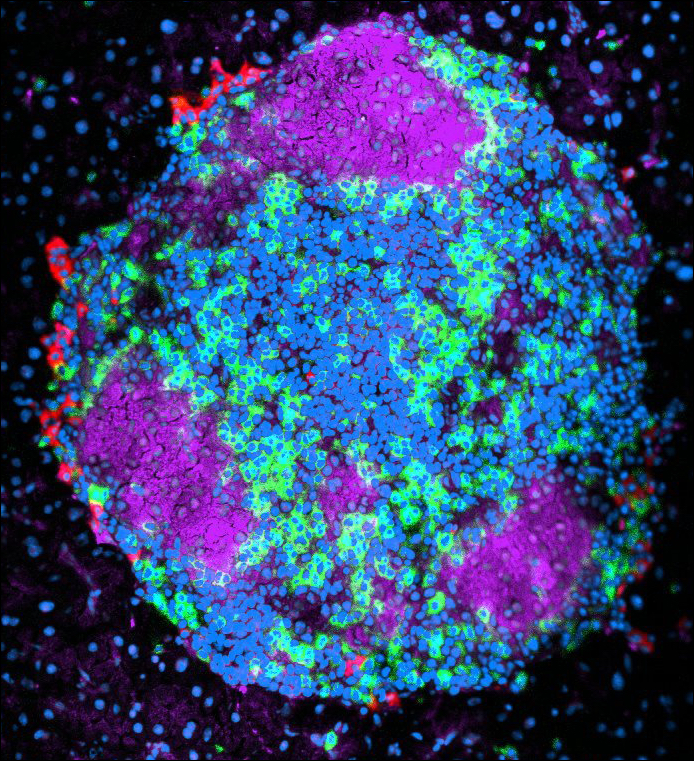The RNA & T Cell Laboratory works in two general research areas. Firstly, we are interested in the molecular mechanisms that control immune cell development. The immune system is comprised of a diverse range of cell types, and each type must be replenished continuously in appropriate numbers and with appropriate functional properties. This ensures that immunity against potential infections is maintained while inappropriate immune responses are suppressed. Any defect in this balance can result in susceptibility to infection or cancer, or the development of autoimmune disease.
Secondly, we are interested in the biogenesis and function of non-coding RNAs. We study how these RNAs are transcribed and processed so they can generate functional molecules. We are also interested in understanding the regulation of the microRNA machinery.
Current research projects
-
Regulation of T cell development
We are interested on uncovering the genetic programs that control the development of T cells in the thymus. We are also interested in understanding the roles of specific antigen presenting cells in this process.
Our current research focuses on understanding how T lineage specification is controlled early in T cell development during the stages known as CD4-CD8- double negative, and late in T cell development during lineage bifurcation.
To investigate T cell development, we employ the latest next generation ‘omics technologies, such as single cell RNA sequencing, that allow us to analyse cells at unparalleled resolution. Gene manipulation technologies, such as RNAi, CRISPR and GM mice then enable us to probe the requirement of identified pathways.
Our goal is to understand how normal T cell development is controlled, and ultimately, how defects contribute to diseases of the immune system, such as autoimmunity and immunodeficiency.
Specific topics include:
- Antigen presenting cells in unconventional T cell development
- The role of class II coronins
- Single cell dissection of developmental checkpoints
- Transcriptional diversification during T cell development
The MicroRNA machineryMicroRNAs are small regulatory RNAs, typically 21-22nt in length, that control the stability and translation of messenger RNAs. The biogenesis of these regulatory molecules is dependent on the RNase III enzymes Drosha and Dicer. However, Drosha and Dicer can also directly regulate the stability of various RNA substrates, independent of their roles in microRNA biogenesis. In the case of Drosha, it degrades certain messenger RNAs via recognition and cleavage of secondary stem-loop structures within these targets. Interestingly, this activity is largely restricted to stem/progenitor populations and is critical for safeguarding the multipotency of these cells.
We are interested in understanding how this mRNA cleavage is regulated and ultimately how/why this mechanism controls stem cell pluripotency, particularly in the haematopoietic stem cells of the bone marrow.
Specific topics include:
- Phosphoregulation of microRNA microprocessor complex
- Messenger RNA cleavage by RNase III enzymes
- Regulation of haematopoiesis by RNA cleavage
People

- Jarrod Skinner, Research Assistant
- Karen Gu, Postdoctoral Researcher
- Angela Wang, PhD student
- Thuy Trang (Jenny) Lam, PhD student
- Dhruti Parikh, PhD student
- Ka Weng (Jenny) Leong, PhD student
- Yangnan Zhang, PhD student
- Andres Marulanda, Masters student
- Yani Zhang, Masters student
- Xinyue Tian, Master student
Student Projects
A novel function for interferon-gamma in preventing T-cell lymphoma
Lab: RNA & T Cell Biology
Supervisor(s): Associate Professor Mark Chong Dr Bala Krishnamurthy
Diseases focus: Healthy AgeingMicroRNA inhibition to modulate regulatory T cell impacts in disease
Lab: RNA & T Cell Biology
Supervisor(s): Associate Professor Mark Chong
Diseases focus: Healthy AgeingRegulation of unconventional T cell development by coronin proteins
Lab: RNA & T Cell Biology
Supervisor(s): Associate Professor Mark Chong
Diseases focus: Healthy AgeingCharacterisation of novel a self-antigen-expressing antigen presenting cell in the thymus
Lab: RNA & T Cell Biology
Supervisor(s): Associate Professor Mark Chong
Diseases focus: Healthy AgeingSelected publications
Oh S, Liu X, Tomei S, Luo M, Skinner JP, Berzins SP, Naik SH, Gray DHD & Chong MMW (2023), Distinct subpopulations of DN1 thymocytes exhibit preferential γδ T lineage potential, Front Immunol, 14:1106652. doi: 10.3389/fimmu.2023.1106652.
Huang CH, Schuring J, Skinner JP, Mok L & Chong MMW (2022), MYL9 deficiency is neonatal lethal in mice due to abnormalities in the lung and the muscularis propria of the bladder and intestine, PLoS One,17:e0270820. doi: 10.1371/journal.pone.0270820.
Gu K, Walpole C, Gooneratne S, Liu X, Haigh OL, Radford KJ & Chong MMW (2022), DROSHA but not DICER is required for human haematopoietic stem cell function, Clin Transl Immunology, 11:e1361. doi: 10.1002/cti2.1361.
Zhang Y, Skinner JP & Chong MMW (2022), Expression of the miR-17~92a cluster of microRNAs by regulatory T cells controls blood glucose homeostasis, Immunol Cell Biol, 100:101-111. doi: 10.1111/imcb.12513.
Oh S, Gray DH & Chong MMW (2021), Single cell sequencing approaches for tracing T cell development, J Immunol, 207(2):363-370. doi: 10.4049/jimmunol.2100408.
Liu X, Andrews MV, Skinner JP, Johanson TM & Chong MMW (2021), A comparison of alternative mRNA splicing in the CD4 and CD8 T cell lineages, Mol Immunol, 133:53-62. doi: 10.1016/j.molimm.2021.02.009.
ORCID profile: orcid.org/0000-0002-3701-7397
Google Scholar profile: https://scholar.google.com.au/citations?user=poeNg8gAAAAJ&hl=en
Related News

December 2024
Discovery opens door for new cancer drugs
Associate Professor Mark Chong is leading a project – supported by a $50,000 Tour de Cure grant – to develop a new class of drugs to inhibit certain microRNAs within the immune system as a novel immunotherapy to treat cancer.

July 2022
mRNA research could be key to type 1 diabetes treatment
A team led by SVI’s Associate Professor Mark Chong, has been awarded a two-year grant from the Victorian Government’s new mRNA Research Acceleration Fund to push forward development of an Australian-first mRNA-based treatment for type 1 diabetes.